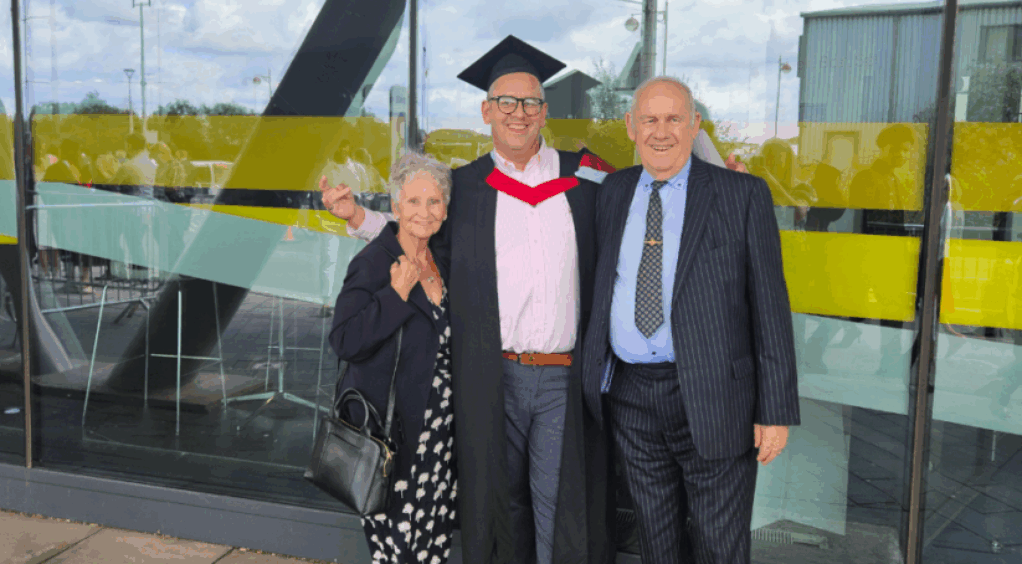Ex-heroin addict who decided to ‘die a junkie’ now a mental health nurse helping others in Derby
A 49-year-old man who used heroin for 24 years and pledged to ‘die a junkie’ is now a mental health nurse helping people in Derby.
Thanks to the support he received from Jericho House addiction centre Will Crowder has gone from selling the Big Issue magazines and injecting heroin every day, to helping others.
Eight years ago, Will woke up and felt something he hadn’t known in nearly two decades – freedom from the compulsion to use drugs. It was June 27, 2017, a date he now marks as the beginning of a new life.
After 24 years of addiction, homelessness, and despair, Will found hope at Jericho House, a residential rehabilitation centre in Alvaston, Derby.
The nine-bed facility offers a holistic, abstinence-based recovery programme for men aged 18 and over, combining housing support, cognitive therapies, education, and resettlement services.
“I’d been injecting for 18 years,” Will recalls. “But that morning, something shifted. I was surrounded by people who understood me. They didn’t judge – they accepted me, built a relationship with me, and helped me rebuild.
Will’s story began in Warwick, where he grew up in a military family and attended boarding school from the age of seven. His teenage years were marked by emotional turmoil – by 14, he was drinking and by 22, heroin had taken hold.
“Heroin wrapped me up,” he said. “It made me feel safe. But within a year, I was injecting, stealing, and living in a hostel. It was a fast slope – I fell apart quickly.”
Despite multiple attempts to quit – through religion, counselling, and various services – Will felt hopeless. “By 32, I’d given up. I decided I would die a junkie.”
For nearly a decade, he sold the Big Issue, masking his pain behind a façade of choice. Then, at 38, a woman from the Way Ahead Project entered his life. She had lived experience and saw through his denial. Her gentle persistence eventually led Will to Jericho House, in Derby.
“I planned to stay six weeks and go back to selling the Big Issue,” he admits. “I wanted to stop, but I didn’t think I could.”
Instead, he stayed nine months, then joined the aftercare programme. In August 2018, he began volunteering – a role he held for two and a half years before enrolling at the University of Derby to study mental health nursing.
In March 2024, at age 48, Will qualified as a mental health nurse. He soon after gained his first ‘proper’ job since he was 21 working for Derbyshire Healthcare NHS Foundation Trust, which provides many of the county’s NHS mental health services. Today, he works as an outreach nurse, supporting people with complex needs in the community.
Will explains that nursing appealed to him because it offered the chance to be of service, with clear opportunities for personal growth and career progression. “It’s a role that provides stability and security, but more importantly, it’s about making a difference every day,” he says. “The sense of purpose, the ability to keep learning, and the support of a strong team are what drew me in.”
He describes the most rewarding aspects of his job as the daily challenges and the camaraderie among colleagues. “We work in demanding and sometimes stressful environments, but the team spirit is second to none. We support each other and our patients, and that makes even the toughest days worthwhile. I thrive on routine and having clear goals, which nursing provides.”
Lee Radford, Chief People Officer at NHS Derby and Derbyshire ICB, has a workforce team working with a broad range of different communities and job centres to encourage people to work in health and care. He said: “People with lived experience bring a depth of understanding, empathy and authenticity that cannot be taught. Their insight is vital to building trust and delivering care that truly meets people where they are.
“Our workforce strategy is about creating opportunities for local people from diverse backgrounds to thrive in the NHS. William’s journey shows what’s possible when we invest in potential and value every story.”
Neil Ainslie, Manager of Jericho House, added: “When the men arrive at Jericho, they are at rock bottom. We help them develop their self-worth and self-control by nurturing their mind, body and spirit. Many of our ex-residents have gone on to become GPs, paramedics, nurses, mechanics – and most importantly, they return to their families as well-rounded fathers, sons, brothers or husbands.”
Will’s lived experience gives him a unique connection with those he supports. “People find me relatable. I’ve been where they are. I know what it’s like to feel hopeless.”
Now, with a strong sense of self and renewed family relationships, Will starts each day with a shower and reading – small routines that keep him grounded.
His message to others is simple: “There is a way out. You are worth it. There’s a life out there beyond your wildest dreams.”
Will’s brother, also in recovery, is working towards completing his Masters in counselling and psychology. Together, they are living proof that change is possible.
“Without Jericho, I wouldn’t be the person I am today,” Will said. “They gave me the space to find myself – and I’ve never looked back.”
For Jericho House call 01332 757 737 or visit Jericho Society.
If you are seeking support for drug or alcohol issues, you can access the Derby Drug and Alcohol Recovery Service through the Derby Drug and Alcohol website. If you, or someone you know, is interested in taking a first step towards working in health and social care, please get in touch to find out how accessible and rewarding these roles can be. For advice on roles or training, contact ddicb.joinedupcareers@nhs.net or 07721324140.

